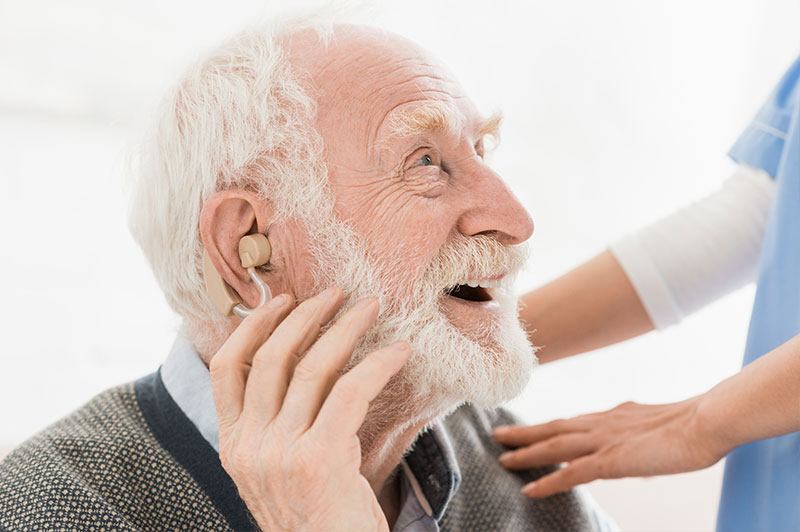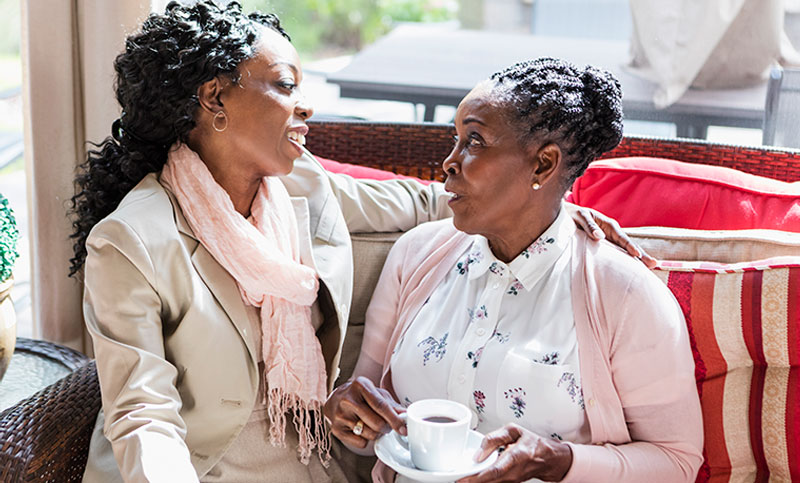
How Treating Hearing Loss May Reduce the Risk of Dementia Are you finding the need to turn the TV up louder for a senior you love? Speaking more loudly? Repeating conversations a senior loved one missed hearing the first time? Hearing loss in seniors is not uncommon. But emerging scientific studies are pointing to a startling connection between hearing loss and an increased risk for dementia. How Hearing and Cognitive Functioning Are Connected There are a few hypotheses researchers are investigating to explain the link between hearing loss and dementia: Decreased social interaction contributes to less mental stimulation and a less active and engaged brain. The brain’s memory and thinking systems are affected when it has to focus harder to strain to hear and also to fill in the gaps when communication is missed. An older brain shrinks more rapidly due to hearing loss. It is extremely important to pinpoint the specific reason for this connection and to determine if treating hearing loss can help. The number of individuals who may be impacted…

Improve Senior Health in Six Easy Steps Lots of people have cast aside their New Year's resolutions by the end of January, but who says resolutions should only be made at the start of the year? There is no time like the present to start a new habit or goal, especially if you’re trying to improve senior health and wellness. We have six recommendations you can implement today. Select one to start, or jump right into all of them to attain the most benefit: Make an appointment for a physical. Instead of waiting for an injury or illness to call the physician, an annual check-up is a good way for older adults to stay on top of their health and potentially prevent problems before they occur. Get physical. With the doctor’s approval and recommendations in hand, begin a brand new physical fitness routine – together! Working out with a senior you love enables you to motivate one another and serve as accountability partners. Agree to sticking to it for a minimum of 21 days, after which it ought to be an ingrained, pleasurable…

How We’re Missing the Mark in Meeting Senior Health Care Needs If your child developed a high fever, who would you call? It’s a no-brainer; many parents have the number on speed dial for the pediatrician they’ve carefully selected to manage the health care needs of their children. With their specialized training, working with a trusted pediatrician ensures the best possible care. Likewise, choosing a health care provider who specializes in senior health care needs is just as important. Yet sadly, the health care system as a whole has not placed a great emphasis on the unique health care needs of seniors. Dr. Carla Perissinotto, geriatrician and professor of medicine at the University of California, San Francisco, shares her concern over this age-related health care gap, and how little professors in med school are focused on elder care. In fact, in her residency, she shares, “We literally did the same thing for forty-year-olds as we did for eighty-year-olds, and we’d treat all eighty-year-olds the same whether they’re dependent or independent,…

COPD Tips: How to Communicate Better with Your COPD Care Partner It began with your inner circle, those closest to you, and has gradually been spreading outward to friends and acquaintances. Sharing your COPD diagnosis and knowing how to answer the many questions that arise about it can be uncomfortable – for you, and for those you’re speaking with as well. Surprisingly, you may find that the greatest challenges come in communicating with your primary care partner – the person who is closest to you. The caregiver/care receiver relationship can raise a variety of emotions. The person on the receiving end of care may feel self-conscious and insecure as a result of needing assistance, which can lead to feelings of anger, sadness, and frustration, just to name a few. The caregiver may feel incapable of meeting all of the required needs, regretful for mistakes made, and downright exhausted from trying to manage someone else’s care needs with their own. There are some key ways to improve communication with your care partner: Make sure you’re both…

Just Diagnosed: Family Caregiver Tips for a New Health Concern It may have been suspected, or perhaps broadsided you out of the blue. Mom has just received the official diagnosis for a progressive disease that’s going to make independent life difficult. While there are lots of uncertainties, one thing is for sure: she is adamant about remaining at home – meaning you’ll have some decisions to make about how to provide for the care she’ll need. Welcome to your new role as family caregiver! If you’re feeling a bit overwhelmed with what to expect next, these tips can help. Learn as much as you can about the disease. The senior’s doctor can provide you with resources and educational materials to help you know what to expect and to gain confidence in your caregiving role. Get organized. Create a folder in which to store important paperwork: test results, prescription details, contact information for physicians’ offices and the pharmacy, and any other pertinent medical information. Start a journal to help track any changes in condition or concerns…

Discover the Secret to Helping Seniors Live Longer What inspires you to get up out of bed each morning? The answer is different for each one of us, of course, but there is one commonality: it could help you to live longer. Scientific studies are showing us that having a feeling of purpose is an integral aspect in longevity, something evidenced in Japan – the country with the highest life expectancy on earth. Interestingly, there is no word for our definition of “retirement” in the Japanese language. Instead, there is a concentration on maintaining meaning and purpose beyond a person’s working years and defining themselves according to their current pastimes and passions. So what are the steps to helping seniors – and ourselves – stay involved in what ignites interest and makes a difference in the world around us? Here are some inspiring suggestions to allow you to get started: Cultivate a sense of compassion for other people. There’s no shortage of suffering in this world, and there’s something that all of us can do in…




















